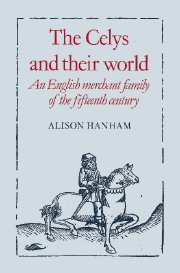Book contents
- Frontmatter
- Contents
- List of figures and tables
- Preface
- Acknowledgments
- List of abbreviations
- PART I THE CELYS AND THEIR CIRCLE, 1474–82
- 1 The Cely family and their background
- 2 ‘Japes and sad matters’
- 3 Alarms and tribulations, 1480–1
- 4 Two black sheep and a nuisance
- PART II THE WOOL TRADE
- PART III RICHARD AND GEORGE CELY, 1482–9
- Postscript on later family history
- Select bibliography
- Index
4 - Two black sheep and a nuisance
Published online by Cambridge University Press: 06 July 2010
- Frontmatter
- Contents
- List of figures and tables
- Preface
- Acknowledgments
- List of abbreviations
- PART I THE CELYS AND THEIR CIRCLE, 1474–82
- 1 The Cely family and their background
- 2 ‘Japes and sad matters’
- 3 Alarms and tribulations, 1480–1
- 4 Two black sheep and a nuisance
- PART II THE WOOL TRADE
- PART III RICHARD AND GEORGE CELY, 1482–9
- Postscript on later family history
- Select bibliography
- Index
Summary
If Robert Cely was really the eldest of the family, he did nothing to sustain the dignity and responsibilities of that position, and in time his brothers found themselves acting as nursemaids for Robert. Possibly he suffered from ill-health, certainly he compounded his troubles by weakness of character and a reluctance to accept advice.
Robert seems to have been a full member of the Staple Fellowship by 1474 or 5, when Thomas Kesten sold six sarplers of wool for him. He was married – young, perhaps, by the usual standards of merchants of the time – by July 1474, when his father sent him a scolding letter:
I understand nothing of receiving of wool, of no good rules of the Place [the staple headquarters], neither in a sale nor in other wise, for the which ye be slow in writing …. And say to George Cely I had no word from him of your coming to Calais, and your wife think ye should have writ to her. Ye forget yourself, what is for to do. Sloth is a great thing, and doth little good [betimes], there as good business doth ease.
Since George was also at Calais for much of his time, he and Robert saw a good deal of each other, and in George's memoranda of this date, ‘my brother’ may refer to Robert and not, as it does later, to Richard. George noted that on 24 July 1474 he borrowed 9s from Robert, and he paid for a pair of spurs which Robert had bought from the stapler Ralph Lemington.
- Type
- Chapter
- Information
- The Celys and their WorldAn English Merchant Family of the Fifteenth Century, pp. 82 - 108Publisher: Cambridge University PressPrint publication year: 1985



